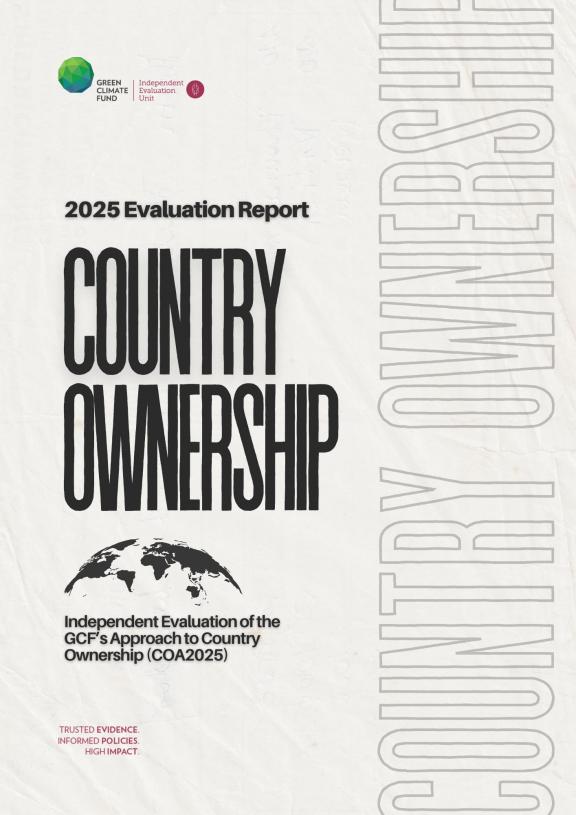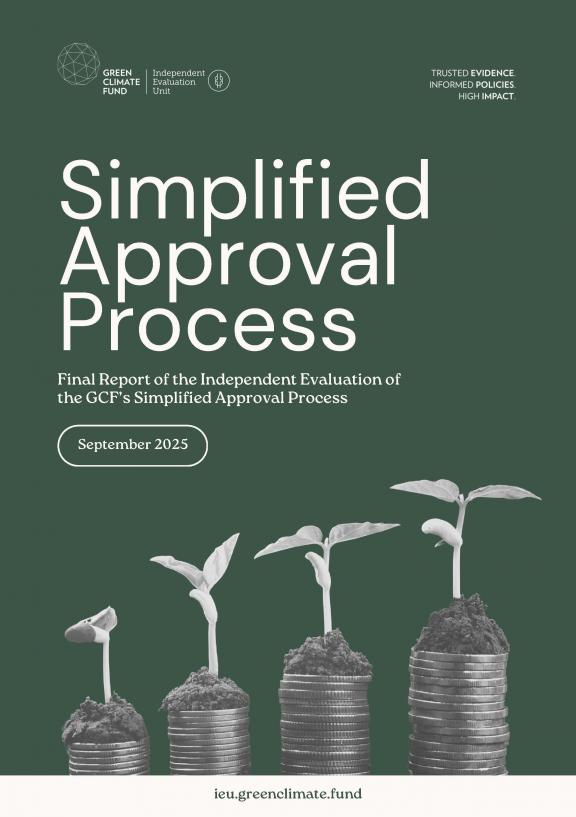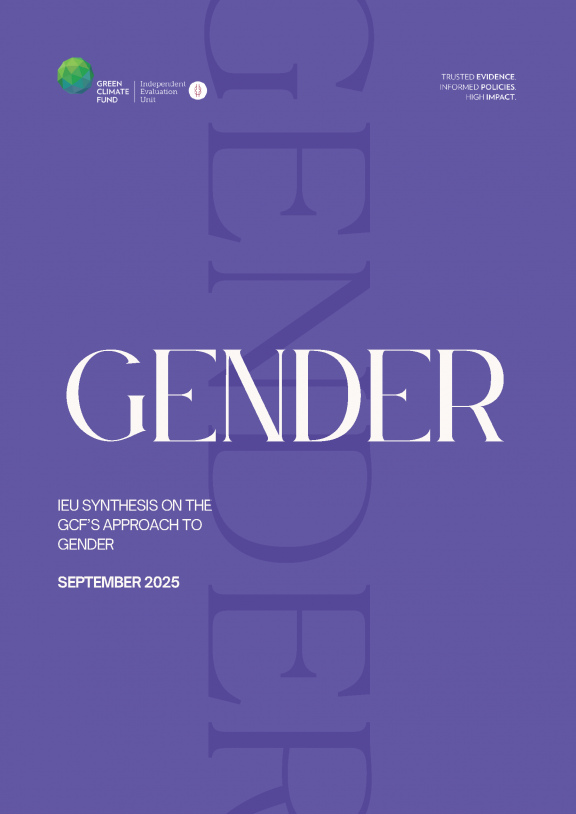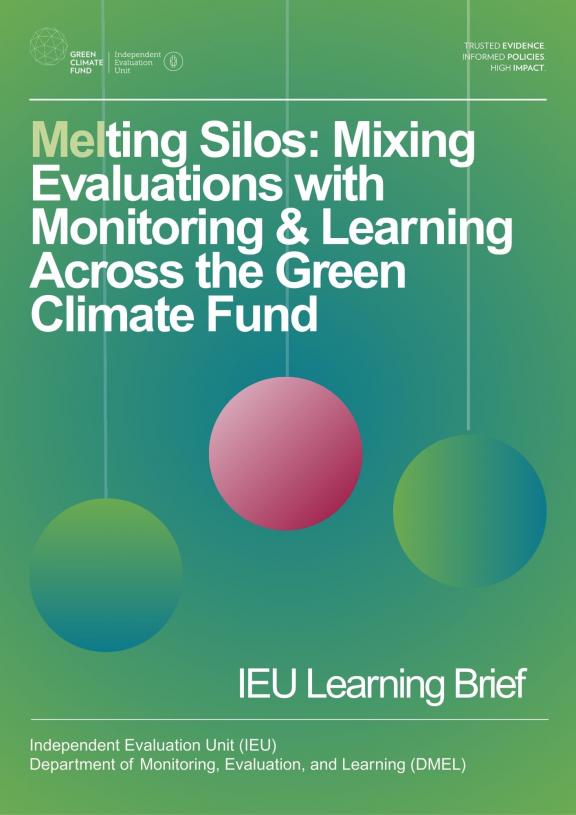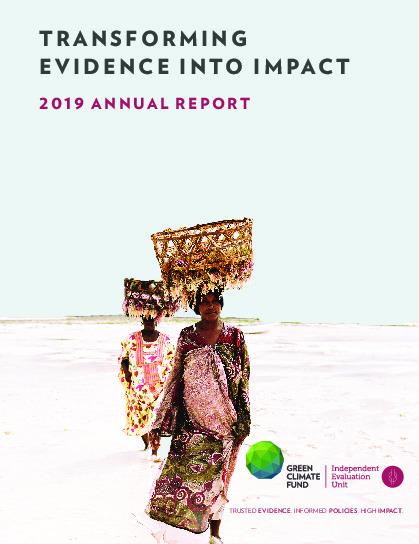IEU publications
IEU publications
To serve the needs of our stakeholders, the IEU issues a variety of publications related to our work, including in the context of evaluations and learning. Keep up with the IEU’s latest publications here.
Featured publications
Independent Evaluation of the GCF's Approach to Country Ownership (COA2025)
This independent evaluation of the Green Climate Fund’s (GCF) approach to country ownership was approved by the GCF Board as part of the 2025 workplan of the Independent Evaluation Unit (IEU) and is submitted in time for its forty-third meeting (B
Independent Evaluation of the GCF’s Simplified Approval Process (SAP2025)
The Green Climate Fund’s Simplified Approval Process (SAP) was created to make climate finance more accessible and responsive, thus enabling smaller, lower-risk projects to address urgent climate needs in vulnerable countries.
Independent Synthesis of the GCF’s Gender Approach
Approved at the fortieth meeting of the GCF Board (B.40), this formative Gender Synthesis consolidates insights from past evaluations, assessments, and studies to inform the forthcoming Independent Evaluation of the GCF’s Gender Approach.
MELting Silos: Mixing Evaluations with Monitoring & Learning Across the Green Climate Fund
This IEU Learning Brief, prepared jointly by the Independent Evaluation Unit (IEU) and the Department of Monitoring, Evaluation, and Learning (DMEL), examines how the Green Climate Fund (GCF) can better align its monitoring, evaluation, and learni
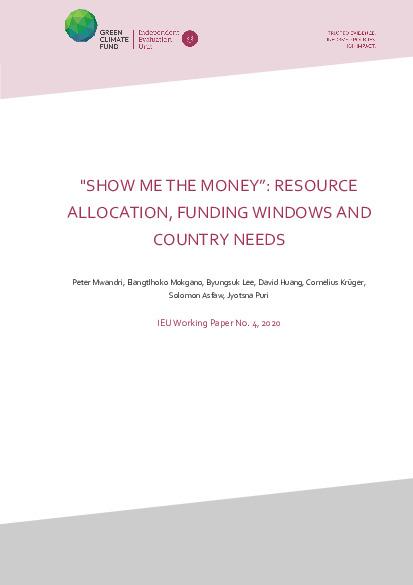
"Show me the money": Resource allocation, funding windows and country needs
June 2020
As the initial resource mobilization period of the Green Climate Fund (GCF) draws to an end with over USD 10 billion received in commitments, this paper examines the GCF’s financial flows over this time. The paper begins by exploring the GCF’s three main funding activities: the project portfolio, the Readiness and Preparatory Support Programme and the Project Preparation Facility. Following by examining the extent to which this funding trickles down to ground-level beneficiaries. Finally, it...
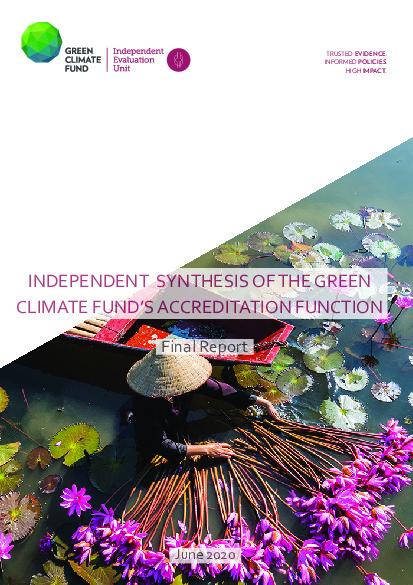
Final report of the Independent synthesis of the Green Climate Fund’s accreditation function
June 2020
The synthesis study was a desk study and examined existing evidence on accreditation. It systematically and objectively synthesized key findings and made recommendations for the GCF’s accreditation strategy. The aims of this study were to (a) collect all relevant documents produced by the GCF Secretariat, IEU and external stakeholders; (b) critically appraise those documents; and (c) synthesize high-quality evidence into knowledge and lessons learned.
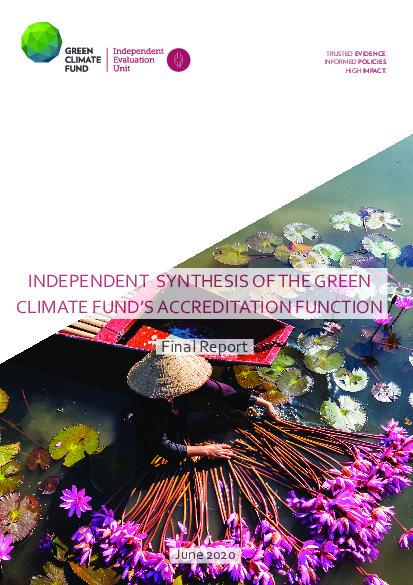
Final report on the independent synthesis of the GCF's accreditation function
June 2020
The Synthesis Study was a desk study and examined existing evidence on accreditation. It systematically and objectively synthesized key findings and made recommendations for the GCF’s accreditation strategy. The aims of this study were to (a) collect all relevant documents produced by the GCF Secretariat, IEU and external stakeholders; (b) critically appraise those documents; and (c) synthesize high-quality evidence into knowledge and lessons learned. This study is not an evaluation but a...

Approach Brief: SIDS2020
June 2020
Small island developing States (SIDS) face numerous climate threats, such as rising temperatures, changing rainfall patterns, flooding, drought and coral reef decline. Due to rising sea levels many SIDS expect to face food and freshwater insecurity. This 2020 2-page introductory brief provides a pre-implementation summary of the IEU’s planned evaluation of the relevance and effectiveness of the GCF’s investments in small island states, including its context, purpose, objectives, scope, methods...
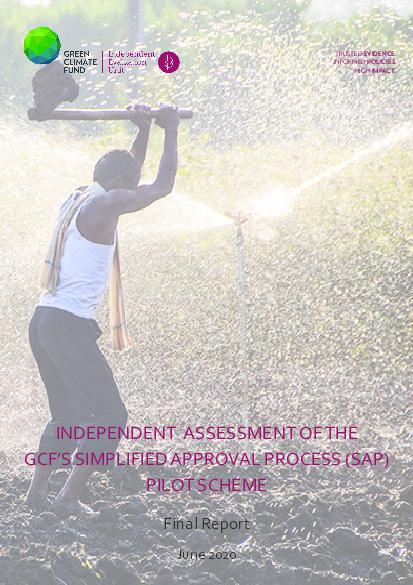
SAP2020: Final report on the independent assessment of the GCF's Simplified Approval Process (SAP) Pilot Scheme
June 2020
Note: This document refers to the evaluation of the GCF's Simplified Approval Process (SAP) undertaken in 2020. For the 2025 evaluation, please visit SAP2025 linked here. At the twenty-fourth meeting of the Board (B.24), the Independent Evaluation Unit (IEU) of the GCF was requested by the Board to conduct an independent assessment of the GCF SAP Pilot Scheme, with the aim of informing the Board on the performance of the SAP, as well as supporting the scheme’s further development.
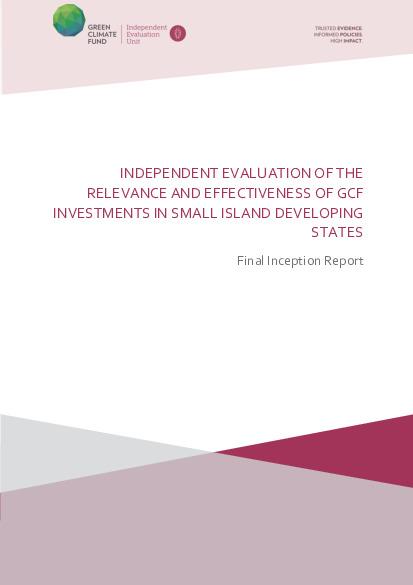
Inception Report for the Independent Evaluation of the Relevance and Effectiveness of the Green Climate Fund's Investments in the SIDS
May 2020
The report is organized as follows: Chapter II provides background and context on the SIDS and climate change challenges, as well as the GCF mandate to address the needs of SIDS. Chapter III summarizes existing relevant research and evidence on climate change impacts on SIDS. It synthesizes the evidence from recently conducted IEU country case studies in SIDS and provides the results of a literature review on climate change solutions in SIDS. Chapter IV presents the key evaluation questions...
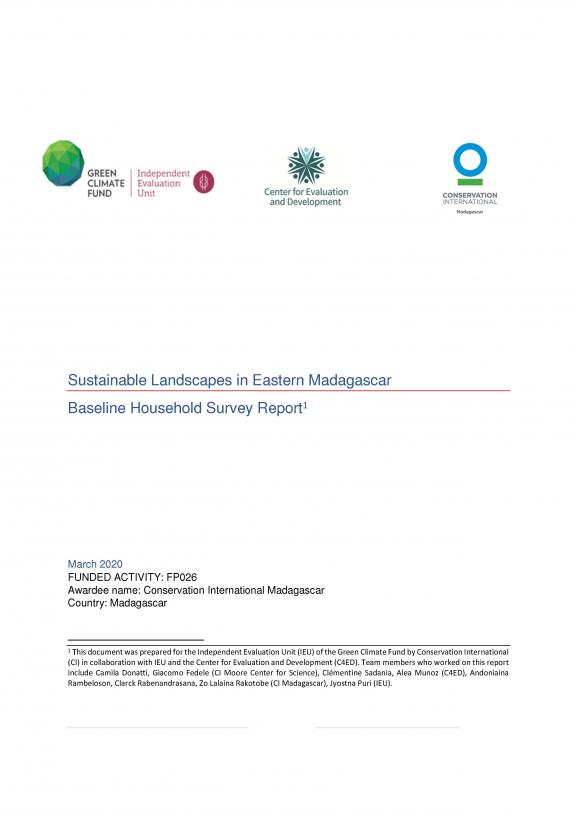
Sustainable Landscapes in Eastern Madagascar : Baseline Household Survey Report
March 2020
This report presents the findings of the baseline household survey for the project "Sustainable Landscapes in Eastern Madagascar" supported by the Independent Evaluation Unit of the Green Climate Fund (GCF) and implemented by Conservation International (CI).
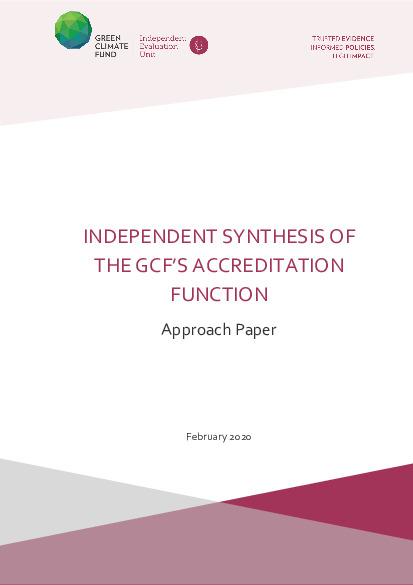
Approach Paper for the Independent Synthesis of the GCF’s Accreditation Function
February 2020
The GCF works through a wide range of institutions in deploying its resources. To access funding, these institutions must fulfil the requirements of an accreditation process. This approach paper describes a suggested method for a desk study that synthesizes the GCF’s accreditation function. The paper explains how the synthesis will examine existing accreditation evidence, synthesize key findings and make recommendations for the GCF’s accreditation strategy. According to the approach paper, the...
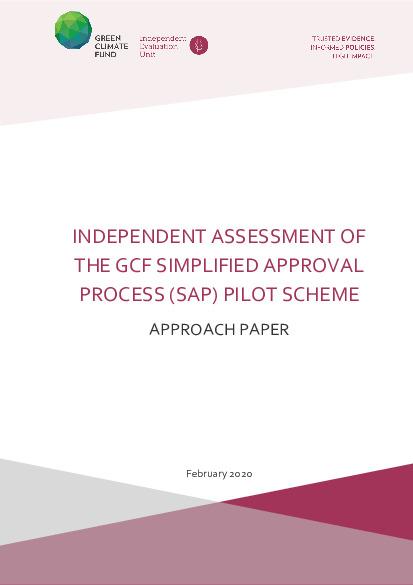
SAP2020: Approach Paper for the Independent Assessment of the GCF SAP Pilot Scheme
February 2020
Note: This document refers to the evaluation of the GCF's Simplified Approval Process (SAP) undertaken in 2020. For the 2025 evaluation, please visit SAP2025 linked here. This document presents the approach the IEU proposes using to assess the performance of the Simplified Approval Process (SAP) Pilot Scheme. The SAP Pilot was approved in Decision B.18/06 (October 2017) with the objective to introduce simplifications (based on best practices) to the GCF project cycle for a particular set of...
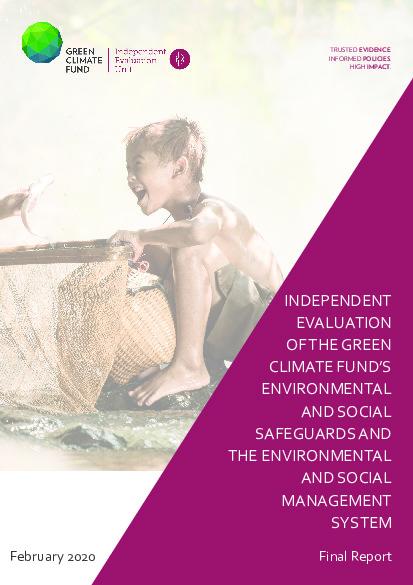
Final report on the independent evaluation of the GCF's Environmental and Social Safeguards and the Environmental and Social Management System (ESS2019)
February 2020
Social and environmental performance and co-benefits are key to the mandate of the GCF and its environmental and social policy (ESP). The evaluation has three main objectives. The first is to assess the extent to which the GCF is effectively preventing, mitigating and managing potential adverse environmental and social impacts of GCF-funded projects. The second is to assess the extent to which the GCF is effectively promoting environmental, social, economic and development co-benefits, and...
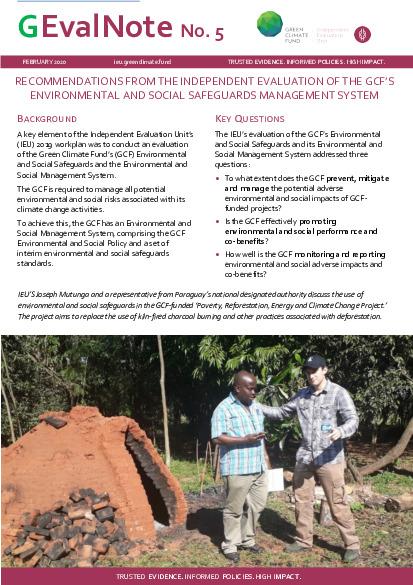
GEvalNote 05
February 2020
To effectively and equitably manage the environmental and social risks of all its investments, the GCF has adopted an Environmental and Social Management System (ESMS), comprising the Environmental and Social Policy and a set of internationally recognized Environmental and Social Safeguards (ESS) standards. This 2020 2-page note introduces decision makers to the key points in the IEU’s evaluation of the GCF’s ESMS and ESS. It describes the report’s background, key questions, recommendations and...
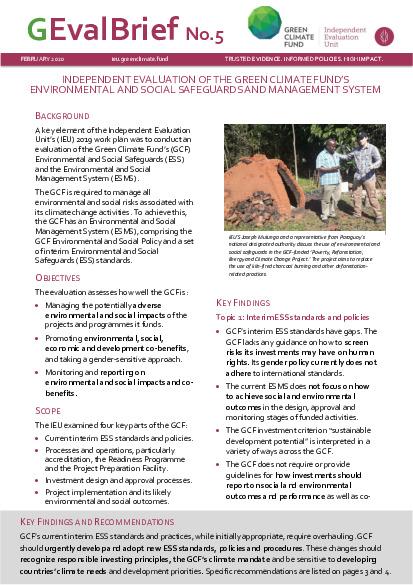
GEvalBrief 05
February 2020
To effectively and equitably manage the environmental and social risks of all its investments the GCF has adopted an Environmental and Social Management System (ESMS), comprising the Environmental and Social Policy and a set of internationally recognized Environmental and Social Safeguards (ESS) standards. This 2020 4-page note introduces decision makers to the key points in the IEU’s evaluation of the GCF’s ESMS and ESS. It describes the report’s background, objectives, scope, key findings,...
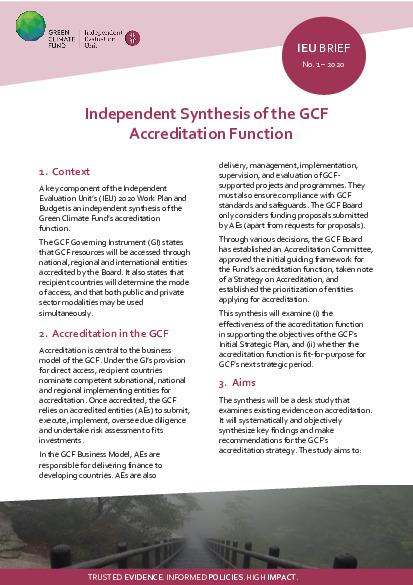
Approach Brief: Accreditation
February 2020
In deploying its resources, the GCF works through a wide range of institutions to finance projects and programmes. To access funding, these institutions must fulfil the requirements of an accreditation process. This 2020 2-page introductory brief provides a pre-implementation summary of the IEU’s planned synthesis of the GCF accreditation function. In describes the synthesis’ context and aim, the accreditation function, output, timing and methods.
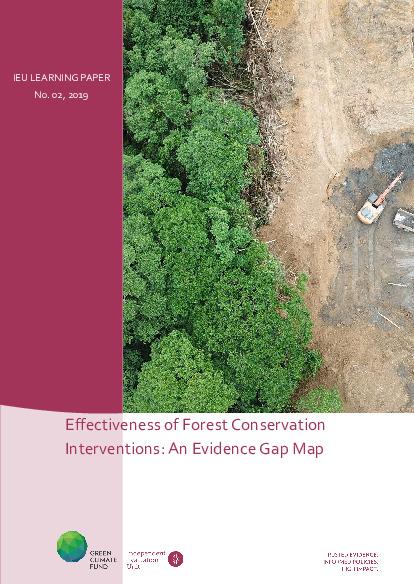
Evidence gap map: Effectiveness of forest conservation interventions
December 2019
This evidence gap map expanded upon a previous study conducted by the International Initiative for Impact Evaluation related to forest conservation interventions. This review updated evidence for the period 2016 to mid-2018 and synthesized this with the coverage of the previous evidence review (1990-2015). Compared to the previous evidence gap map, the evaluation of forest conservation outcomes has clearly accelerated in recent years, but from a modest base: the body of evidence still remains...
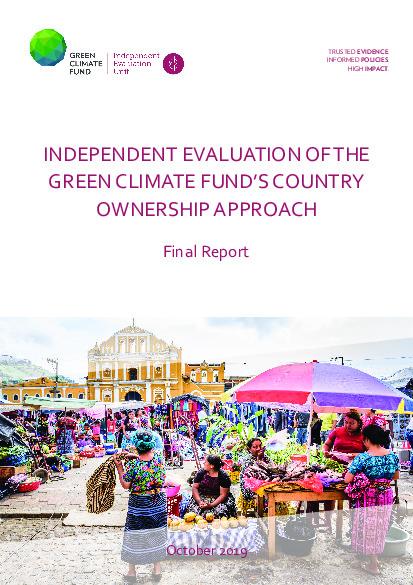
COA2019: Final report on the independent evaluation of the GCF's Country Ownership Approach
October 2019
Note: This page refers to the evaluation of country ownership undertaken in 2019. For the 2025 evaluation, please visit COA2025 here. The GCF Independent Evaluation Unit conducted this evaluation as part of its 2019 Work Plan, which was approved by the GCF Board at its twenty-first meeting (B.21) in October 2018. The evaluation answers four important questions: How does the GCF conceptualize and operationalize country ownership from the strategic and policy perspective? How does the GCF...
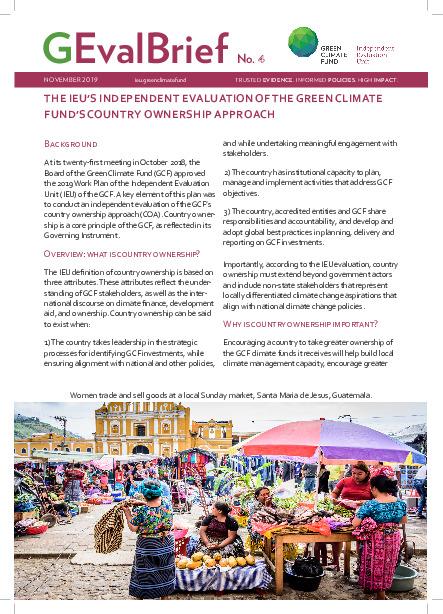
GEvalBrief 04: COA2019
October 2019
Note: This page refers to the evaluation of country ownership undertaken in 2019. For the 2025 evaluation, please visit COA2025 here. Country ownership is central to the GCF’s pursuit of a paradigm shift towards low-emission and climate-resilient development in developing countries. Better understanding how well GCF is succeeding in ensuring countries take ownership of climate change investments can help improve the effectiveness of climate change actions on the ground. This 2019 4-page note...
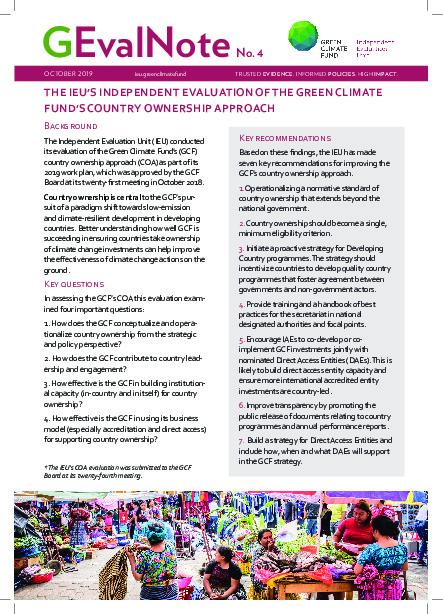
GEvalNote 04: COA2019
October 2019
Note: This page refers to the evaluation of country ownership undertaken in 2019. For the 2025 evaluation, please visit COA2025 here. Country ownership is central to the GCF’s pursuit of a paradigm shift towards low-emission and climate-resilient development in developing countries. Better understanding how well GCF is succeeding in ensuring countries take ownership of climate change investments can help improve the effectiveness of climate change actions on the ground. This 2018 2-page note...
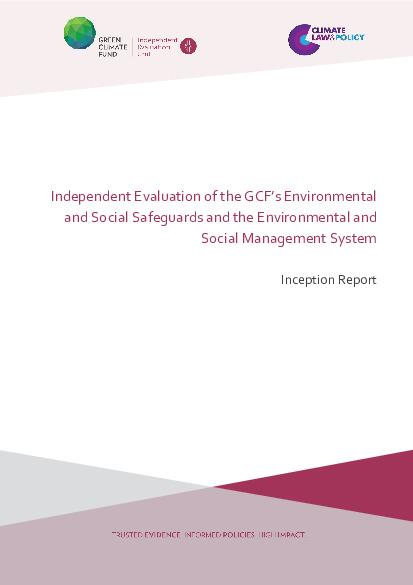
Inception Report for the Independent Evaluation of the GCF’s ESS and ESMS
June 2019
During the twenty-first meeting of the GCF Board, the 2019 work plan of the Independent Evaluation Unit was approved, which lays out the different independent evaluations to be conducted in 2019. One of the evaluations to be conducted by the IEU is an independent assessment of the ESS and ESMS of the Green Climate Fund
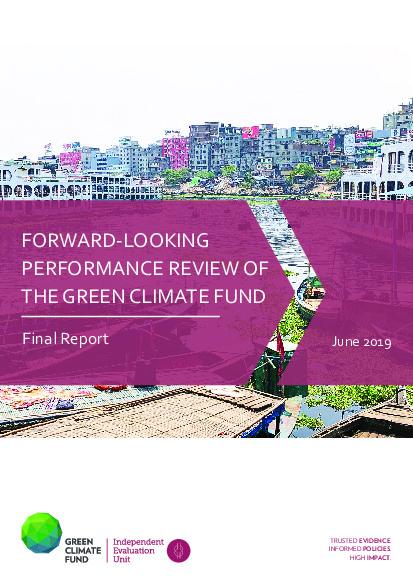
Final report on Forward-looking Performance Review of the GCF (FPR2019)
June 2019
At its twenty-first meeting (Manama, 17–20 October 2018) the GCF Board initiated and approved a review of the GCF and asked the GCF Independent Evaluation Unit (IEU) (decision B.21/17) to finalise the process by 30 June 2019. The purpose of the FPR is to encourage the GCF to learn from its experience so far, support accountability, assess how the GCF has performed in delivering its objectives, and look forward, by providing actionable and pragmatic recommendations for enhancing performance. ...
